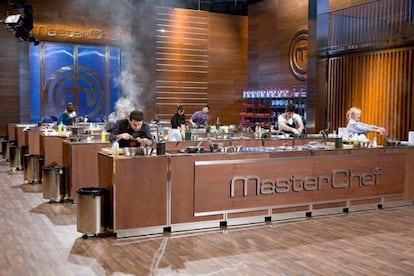‘MasterChef’: a recipe for disaster at TVE?
The Spanish version of the international hit show has not been well received

The Spanish version of the wildly popular television culinary talent show MasterChef premiered last week amid great expectations, but food and television critics are already expressing disappointment, using terms such as "unoriginal" and even "martial" to describe it.
"There was not the slightest spark of spontaneity in nearly two hours, quite a record," complained Mikel López Iturriaga, author of EL PAÍS food blog El Comidista. "Everyone seemed determined to prove that this is a very serious contest, that it's really demanding, that people don't just come here to goof around. But they took it too far, and their lack of tact, of empathy, of compassion for those poor people who are having a terrible time as they struggle with a whole turbot for the first time in their lives, turned what should have been an emotional show into coverage of culinary-military maneuvers."
Beatriz Manjón of Abc also wrote about MasterChef 's "martial tone," while El Mundo 's food blog Paco a la naranja expressed serious doubts as to whether the show would do as well in Spain as in the 140 countries where it has already aired, chiefly because of the dourness of the jury and the poor quality of the script: "The excess of short, immortal phrases that screenwriters put in jury members' mouths is simply unbearable."
Does 'MasterChef' really contain cultural ingredients, or is it just a reality show?
Yet MasterChef had been touted as one of the state broadcaster's leading shows of the season by RTVE chairman Leopoldo González-Echenique. In the nine months that he has held the post, new releases have been few and far between at the debt-laden station, and MasterChef was given prime-time scheduling. Before the big premiere, RTVE had been drumming up interest in the show by covering the castings in various Spanish cities. Only 15 candidates were selected from the 9,000 who showed up.
In the end, the first episode was watched by an average of 2,058,000 viewers, representing 11 percent of the audience share.
But the quality of its content is not the only contentious thing about MasterChef . The show enjoys a status known as "cultural sponsorship," which means it can obtain additional financing from outside sources. Two commercial brands are supplying the kitchen utensils and the food used to prepare the menus. The production company claims that the program "showcases our gastronomy" and is good for the Spain brand. The state broadcaster argues that "it encourages talent in one of the most relevant aspects of Spanish culture: gastronomy," and supports values such as "dedication, effort, self-improvement and teamwork."
But tax authorities are not so sure. The cultural sponsorship tag appears to have become an easy way for TVE to reduce the cost of producing programs. A few months ago, an audit report by the Treasury questioned the way the state broadcaster was using the concept.
Does MasterChef really contain cultural ingredients, or is it a reality show pure and simple? "It's a talent show with the ingredients of a game show. There is competition and prizes," says Enrique Guerrero, a professor at Navarre University. "There's something of a reality show about it too, because the casting seeks different profiles that viewers can relate to, with contestants who play different roles."
Guerrero does not doubt that gastronomy is culture. "But it's another issue whether a program about gastronomy is culture."
Tu suscripción se está usando en otro dispositivo
¿Quieres añadir otro usuario a tu suscripción?
Si continúas leyendo en este dispositivo, no se podrá leer en el otro.
FlechaTu suscripción se está usando en otro dispositivo y solo puedes acceder a EL PAÍS desde un dispositivo a la vez.
Si quieres compartir tu cuenta, cambia tu suscripción a la modalidad Premium, así podrás añadir otro usuario. Cada uno accederá con su propia cuenta de email, lo que os permitirá personalizar vuestra experiencia en EL PAÍS.
¿Tienes una suscripción de empresa? Accede aquí para contratar más cuentas.
En el caso de no saber quién está usando tu cuenta, te recomendamos cambiar tu contraseña aquí.
Si decides continuar compartiendo tu cuenta, este mensaje se mostrará en tu dispositivo y en el de la otra persona que está usando tu cuenta de forma indefinida, afectando a tu experiencia de lectura. Puedes consultar aquí los términos y condiciones de la suscripción digital.









































